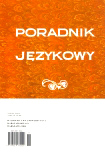Zaimki anaforyczne jako kwantyfikatory czasowe. Analiza semantyczna leksemów wówczas, podówczas, ówcześnie, ówczesny
Anaphoric Pronouns as Temporal Operators of Quantification. The Semantic Analysis of Lexemes: wówczas, podówczas, ówcześnie, ówczesny
Author(s): Joanna KościerzyńskaSubject(s): Language and Literature Studies
Published by: Dom Wydawniczy ELIPSA
Keywords: semantyka; podówczas; ówczas; ówcześnie;
Summary/Abstract: The article is an attempt to explain the meaning of the Polish anaphoric pronouns mentioned in the title by means of semantically unconvertible words. Their English equivalents are e.g. 'then', 'at that time'. The analyzed words can be considered text organizers, which specify not only the time of an event or a situation but also the time coherence between the subordinate and the main clause. Thus the eventual explanation is as follows: 'Saying "x" I want you to know when x You know when Because of my talk And what I am saying is true' (X-predicate related with related lexeme). However the explanation of ÓWCZESNY will be different because this lexeme, as an adjective, has a different position in predicative structure: 'I am talking about x Saying "x" I want you to know when x was You know when Because of my talk And what I am saying is true.'
Journal: Poradnik Językowy
- Issue Year: 2005
- Issue No: 03
- Page Range: 8-14
- Page Count: 7
- Language: Polish
- Content File-PDF

